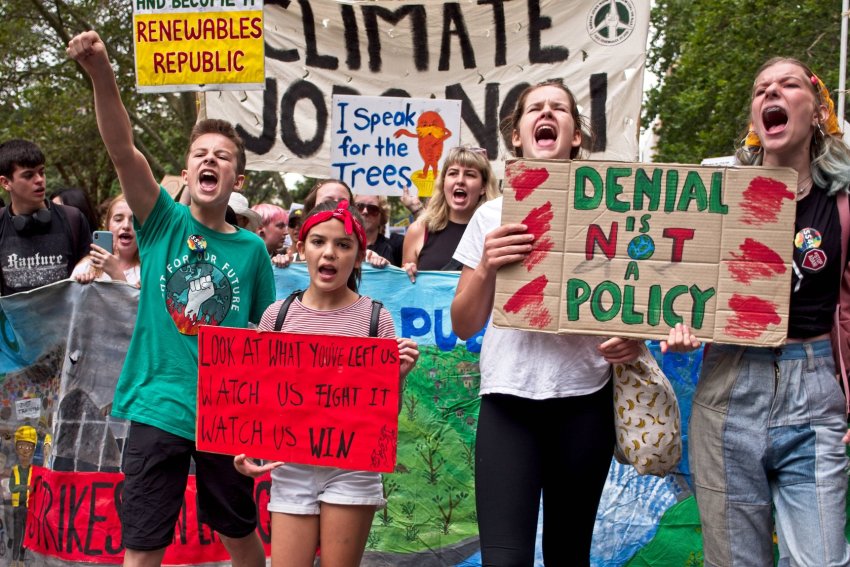
“Get the politics out of climate change.” It’s a slogan heard almost inevitably whenever discussion turns to the looming environmental catastrophe.
You can understand why, given the paralysis gripping both major parties. If politicians cannot — or will not — do anything as the natural world falls apart, it is scarcely surprising that people seek an alternative to them and their politics.
Yet the common-sense enthusiasm for depoliticising environmentalism — voiced most recently in relation to the bill proposed by conservative independent MP Zali Steggall — pushes in entirely the wrong direction.
In part, the complexity of carbon modelling encourages a faith in apolitical solutions. Because most of us struggle to read dense mathematical papers about ice flows and atmospheric temperatures, calls to “listen to the scientists” rather than the politicians make sense.
If we would not want our surgeon to have learnt her doctoring from YouTube, we should not take assessments about carbon levels and temperature patterns from right-wing bloggers — and yet, of course, many of our leaders do.
Yet a respect for expertise should also mean a recognition of its limits. While physics explains the processes heating the atmosphere, it does not — and cannot — provide direction as to how we should respond to those processes. On the contrary, because climate change follows from our relationship with nature, it forces us to consider how we should live — the central question for the political sphere.
Unfortunately, a conflation between science and politics runs throughout even the respectable literature on climate change, since much of the research makes assumptions about economic activity and social life that naively extrapolate from the status quo.
That is particularly important because, while the “apolitical” approach gets touted as a way of winning over the public, in practice it is invariably defended as a way of wooing parliamentarians. A rhetoric stripped of politics will, we are told, allow MPs of goodwill from both parties to abandon their silly culture wars and come together for the benefit of the planet.
Of course, the divide over climate change bears less relationship to will (whether good or bad) than to power, specifically the power of those individuals and corporations enriched beyond measure by fossil fuels.
Both major parties now contain sizeable groupings tied politically, organisationally and financially to the carbon lobby. It is those factions that give rise to culture war, not the other way around.
Because the support for business as usual rests on material interests rather than ideas, the pro-carbon politicians will not be swayed by clever framings or conciliatory messaging. In the unlikely event they can be induced to sign up to the Steggall project, they will do so only to surreptitiously wreck it.
After all, throughout parliament the enemies of climate action masquerade as its friends.
Last week, for instance, we discovered the existence of the co-called Otis Group, a semi-organised faction of pro-coal Labor Party MPs. In public, many of those people mouthed along about the importance of fighting global warming; in private, they came together to buttress fossil-fuel interests.
Similarly, Canberra is now blessed with a Parliamentary Friends of Climate Action, described as an “attempt to take partisan politics out of the nation’s climate policies”.
Members of that august body include Tim Wilson, whom you may remember as the former Human Rights Commissioner who thought protesters should be water cannoned.
In a previous life, Wilson worked for the Institute for Public Affairs (IPA) — specifically, as the Director of Climate Change Policy. Yes, that is right. For many years, our pro-climate change guy ran the IPA’s campaign to foster climate denialism (you can watch him denouncing Labor’s carbon tax here).
Now, you might believe that Wilson’s undergone a Damascene conversion since realising where electoral sentiment lay, or you might wonder as to the kind of “climate action” that attracts such friends.
The example illustrates the urgent need not for consensus but for its opposite, the kind of polarisation that might unmask the pro-carbon politicians and drive them out of respectable political life.
To put it bluntly, there’s no historical parallel for a social change comparable to that required to decarbonise the developed world without huge political polarisation.
Think of the defence of discriminatory marriage laws mounted by reactionaries only a few years ago. The passage of equal love legislation did not require any significant economic changes and yet conservatives fought tooth and nail against it for years.
By contrast, the prevention of catastrophic climate change threatens the billion-dollar assets of corporations whose tendrils run all through society.
Is it sensible to pretend all that wealth and power will shrug its shoulders and exit the stage of history, simply because it is asked nicely? Or would it be less utopian to expect a struggle and prepare accordingly?
One of the biggest obstacles in responding to the environmental emergency lies in the understandable suspicion by people that economic reform — which is what decarbonisation involves — means they are about to get screwed over by technocrats once again.
The revolt by the Yellow Vests (Gilets Jaunes) in France against a carbon tax penalising drivers illustrates what happens when climate action does not feel to the public like something they do, but instead becomes something done to them.
That is why, rather than proclaiming their indifference to politics, environmentalists need to articulate a program that links a defence of the planet to a defence of the working class — not as an optional extra but out of a recognition that, without popular support, decarbonisation simply won’t happen.
[Jeff Sparrow is a writer, editor and honorary fellow at Victoria University. Reprinted with permission from the author and Eureka Street.]